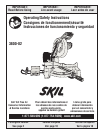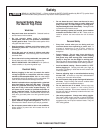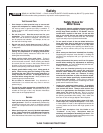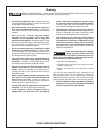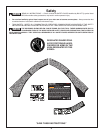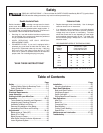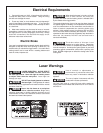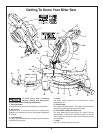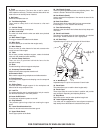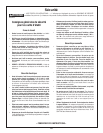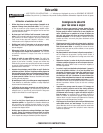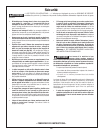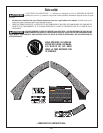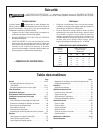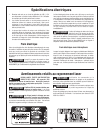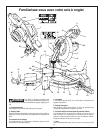
7
Electrical Requirements
1. Connect this saw to a 120V, 15-amp branch circuit with a
15-amp time delay fuse or circuit breaker. Using the wrong
size fuse can damage the motor.
2. Fuses may “blow” or circuit breakers may trip frequently if
motor is overloaded. Overloading can occur if you feed the
b
lade into the workpiece too rapidly or start and stop too often
in a short time.
3. Most motor troubles may be traced to loose or incorrect
connections, overload, low voltage (such as small size wire in
the supply circuit or to overly long supply circuit wire). Always
check the connections, the load and the supply circuit
whenever motor does not work well.
Electric Brake
Your saw is equipped with an automatic electric brake which is
designed to stop the blade from spinning in about ten (10)
seconds after you release the trigger switch. It is useful when
making certain cuts in wood where a coasting blade would
result in a wide, imprecise cut.
When electrical power is lost due to blown
fuse or other causes, the motor will
gradually slow down and the braking action is initiated ONLY
by the release of the trigger switch.
The electric blade brake of your miter saw has been designed
f
or highest degree of reliability, but unexpected circumstances
such as contamination on the commutator and brushes or
failure of motor’s components can cause the brake not to
a
ctivate. If this condition occurs, turn the saw “ON” and “OFF”
four to five times without contacting the workpiece. If the tool
operates but the brake does not consistently stop the blade in
about ten (10) seconds, DO NOT use saw and have it
serviced immediately.
The brake action of this saw is not
intended as a safety feature. Remember
to let the saw blade come to a complete stop before removing
from the workpiece. As always the guard system is your best
protection against unintentional contact with a spinning saw
blade. NEVER wedge open or defeat the closing action of the
lower guard.
LASER RADIATION. AVOID DIRECT
EYE EXPOSURE. DO NOT stare into
the laser light source. Never aim light at another person
or object other than the workpiece.
Laser light can
damage your eyes.
DO NOT use tinted glasses to enhance
the laser light.
Tinted glasses will reduce
overall vision for the application and interfere with the normal
operation of the tool.
Never aim the beam at a workpiece
with a reflective surface.
Bright shiny
reflective sheet steel or similar reflective surfaces are not
recommended for laser use. Reflective surfaces could direct
the beam back toward the operator.
Use of controls or adjustments or
performance of procedures other than
those specified herein may result in hazardous radiation
exposure.
The use of optical instruments with this
product will increase eye hazards.
The laser light guide is a class IIIA laser with a maximum
output power of 5.0 mWatts and conforms to 21 CFR 1040.10
and 1040.11.
Laser Warnings
WARNING
!
WARNING
!
WARNING
!
DANGER
!
CAUTION
!
WARNING
!
WARNING
!



